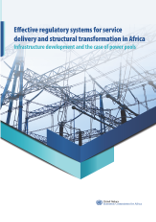Effective regulatory systems for service delivery and structural transformation in Africa

The study seeks to enhance understanding of the opportunities and challenges with regard to harmonizing regulatory systems for infrastructure development, with a focus on power pools. Using a framework from Kapika and Eberhard (2013), the study provides an analysis of the regulatory system of the Eastern Africa power pool, while highlighting the importance of solid regulatory and institutional frameworks for the development of infrastructure and, in particular, of power pools in Africa.
Specific objectives are to:
a) Analyse the current state of the electricity market in Africa as it relates to the structural transformation agenda of the continent;
b) Understand the context of existing power pools, with a view to identifying gaps, challenges and opportunities;
c) Identify and further emphasize the need for effective regulatory systems for power pools and how they can be strengthened for infrastructure development in Africa;
d) Provide input to ongoing processes on infrastructure development from the perspective of economic governance.
Power pools have been selected as a focus for a number of reasons: they are key stakeholders in the development of the energy sector by facilitating regional power trade; they can contribute to the development and harmonization of regulation at the regional level through their functions, which require the convening of representatives of member countries; and, notwithstanding their potential, they remain an underdeveloped and a minimally tapped institutional mechanism.